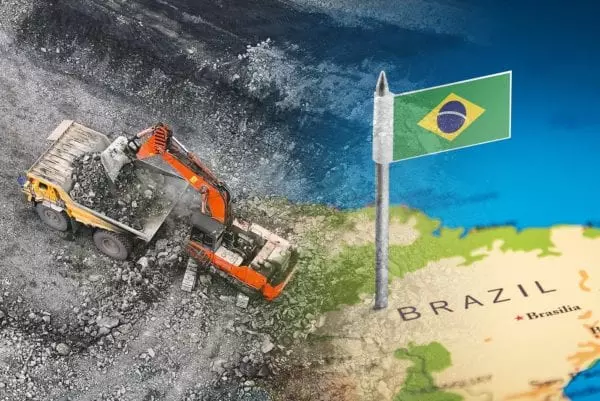
Brazil was the world’s third-largest source of chrysotile asbestos, until a Federal Supreme Court verdict banned the mineral in 2017. Despite the ban, recent reports state asbestos exports continue in Brazil. Thousands of tons of asbestos have been transported through Brazil to neighboring countries and beyond.
The dangers of asbestos have been well-known for decades. Asbestos exposure is the only known cause of mesothelioma, a rare and aggressive cancer. More than 60 countries have banned asbestos, with many others implementing regulations to limit the mineral’s use. Despite the bans and regulations, asbestos use is still legal, under certain conditions, around the world.
Dangerous Transport of Asbestos in Brazil
The 2017 ban of asbestos in Brazil stopped mining, processing, distribution and marketing of the mineral. Those in favor of continued asbestos use pushed back against the regulations, agreeing to cease asbestos use within Brazil, but hoping to continue exporting the material. In May 2019, Governor Ronaldo Caiado put forth legislation in the Brazilian state of Goiás, approving chrysotile asbestos mining and export within the state.
Although the Supreme Court is likely to repeal the legislation, advocates for a ban feel measures were wrongfully taken to evade the Federal Supreme Court ruling in 2017. Advocates argue that although asbestos isn’t being implemented into products in Brazil, it is being transported out of the state through areas where the carcinogen is illegal.
People who mine or transport asbestos face exposure to the dangerous mineral. This has been a concern long before the ban. In June 2009, a carrier truck was found transporting white asbestos in torn packaging, which was damaged with wooden splinters that disturbed the carcinogen. Passersby, the truck employees and responders on the scene were put in danger.
Accidents have also occurred involving asbestos transport vehicles, putting other passengers and response teams at risk of exposure. For example, a truck carrying 26 tons of asbestos was involved in an accident on Anhanguera Highway in 2010.
Companies Responsible for Asbestos Transport
Companies that have been under fire for the transport include Eternit, Sama and Rápido 900 de Transportes Rodoviários Ltda. Their roles in asbestos transport include:
- Eternit: A construction material supplier that owns the last asbestos mine in Brazil
- Sama: A member of Eternit group and the sole producer of asbestos in Brazil
- Rápido 900 de Transportes Rodoviários Ltda: One of the largest national carriers of asbestos ore
- RodoJúnior: Another popular transportation company responsible for asbestos transport
As of December 2019, Sama’s goal was to quickly mine and stock 4,000 tons of asbestos for export. On December 12, 2019, eight trucks from Rápido 900 de Transportes Rodoviários Ltda were found each carrying 26 tons of asbestos. Due to its hefty production goal, Sama has also been employing other trucking companies to move asbestos from Minaçu to Belém, a port city.
The main route from Minaçu and Belém is around 1,022 miles. The lengthy route requires asbestos-carrying trucks to pass through states where asbestos is forbidden. As a result, authorities put restrictions in place at roads and ports to regulate Sama’s movement.
Sama’s transport of asbestos on federal roads is of particular concern to Fernanda Giannasi, who feels asbestos should be contained within its legal geographical boundaries. Giannasi is the Labour Inspector for the Ministry of Labour and the founding member of Associação Brasileira dos Expostos ao Amianto (ABREA), an association dedicated to asbestos-exposed workers in Brazil.
Giannasi responded with concern that Sama’s trade of asbestos through Goiás poses a health threat. She noted the company’s actions also go against the country’s Supreme Court verdict. The advocate has already helped 3,500 Brazilian workers file asbestos lawsuits as a result of occupational exposure.
Risks of Asbestos Trade in Brazil
Little research has been published in regards to asbestos exposure and mesothelioma in Brazil, though studies have looked at death rates from tracheal, bronchial and lung cancers. Of 1.8 million lung cancer deaths in 2018, just more than 72,000 were recorded in South America and the Caribbean. The Brazilian National Cancer Institute reported 27,000 deaths in 2016.
Brazil’s involvement with the production of chrysotile asbestos is thought to be a leading cause of cancer-related deaths in the country, for men and women. Similarly, Asian countries importing asbestos from Brazil show high mortality rates from asbestos-related cancers.
Countries receiving exports of asbestos from Brazil have also addressed asbestos health concerns and taken legal action. Delegates from Japan, India and Indonesia began the Asian Ban Asbestos Mission in 2019. Delegates felt that if the material wasn’t safe for use in Brazil, it wasn’t safe for use in other countries. Asbestos sent directly from Sama to India was labeled with warnings. However, the warnings were in languages foreign to those handling the asbestos, putting them at further risk of not understanding the implications of asbestos handling.
As other countries acknowledge the dangers of asbestos use, Brazil’s exports are likely to come under further scrutiny. Even when asbestos bans are enacted, specific uses and exports may still be permitted. Advocates continue to fight for a worldwide ban, hoping to put an end to health risks associated with the mineral.




